- Homepage
- Our green garden
- Confessions of a Waste Picker
Confessions of a waste picker
Confessions of a waste-picker sets out the good, the bad and the ugly of dumpster-diving. Does the fennel go to make a soup, or will it be planted in the garden? Or should it go simply to the worm farms?
I am sure those of you who read Chris Ellis’ graphic blog in the Witness on the stark poverty facing South Africa in these Covid-19 times were moved as I was; every silver lining is marred by very dark clouds. The only point to add is that obesity kills twice as many people in the world as starvation.
His article has prompted me to "come out." I have some empathy now with gay folk, knowing that tongues will be clicking, and disapproval the order of the day.
Our first experience with waste picking was as poor students in Chicago with two small children. Walking to the supermarket we took a short-cut through the back; boxes of single grapes in the dumpster that had fallen from the full, ripe bunches, and could not be sold, met our hungry eyes.
Many years of relative affluence passed when any thought of waste picking would have been abhorrent; until I made the decision to go worm-farming. Each little creature eats its own weight in food every day and I probably now have several million.
The vermicompost and wee go into our green garden and the chickens feast on the worms. But feeding them soon became a nightmare as they ate us out of house and home; enter waste-picking, after the discovery that the greengrocer tosses out piles of rotten food that the wrigglies find very appetising.
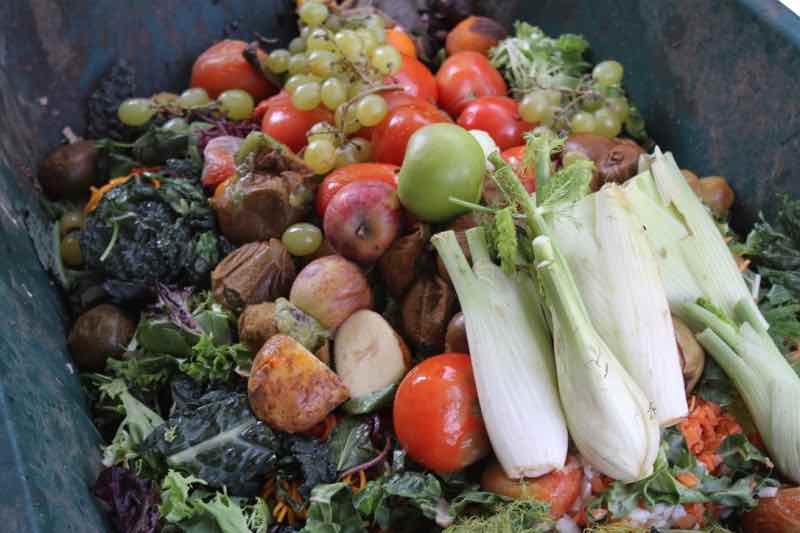
It is an unpleasant business to say the least but the sheer delight of the hens and the profound growth of our plants makes it all worthwhile. It has taught me the importance of scrubbing the nails, and washing thoroughly, perhaps the reason I have escaped C-19 so far, though I’m convinced we will all be exposed eventually.
As an aside, I eventually applied Pascal's wager, an interesting little game of probabilities, and decided to get vaccinated and cut out all refined carbs; the virus is targeting those with raised blood-sugar. It turned out to be the right strategy; for me it was no more than the little flu.
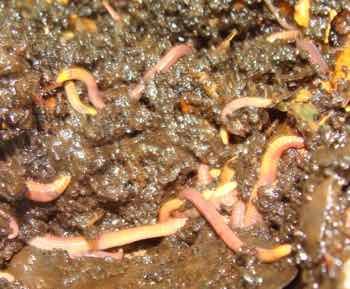
The garbage that I bring home can be roughly divided into five-groups. Initially all went to the worms, until I realised that some of the stuff wasn't too bad, and would be enjoyed by the chickens;
microgreens, sprouted seeds and baby tomatoes keep them in
fine fettle. Just watching them attack the pile, and their happy
clucking makes my day.
Time passed and I started to notice that
here and there a rotten onion was starting to sprout, or that you could
take a lettuce and plant it in the garden. Once, there was a whole
bag of very old broad-beans, and I was able to harvest at least 300
seeds; we are still enjoying their progeny every day.
Thereafter came the discovery that it was no coincidence that the tremor in my right hand had abated; it's all about a phytonutrient called L-dopa that we benefit from during the broad bean season.
All over our garden now you will see rows of spring-onions, herbs like lemongrass and potatoes, all thanks to the Dumpster Diver’s activities on Saturday mornings.
This summer we are harvesting new potatoes from three large patches grown from old spuds gleaned from the dumpster. It is in fact the only way we should eat them. Those from cold-storage have a very high glycemic index; they raise our blood glucose and make us fat.
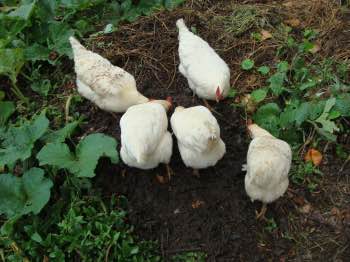
The dogs too get a few chicken bones, and every now and then a choice bit of steak that has passed its sell-by date.
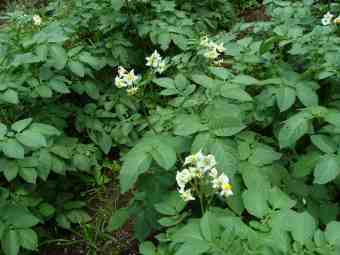
Confessions of a waste picker
Confessions of a waste picker points out that some humans are the vultures of today that clean up the garbage at our dump-sites.
And then there's the fifth group. For five-years we strictly would not consume any of the food ourselves, but of course I did notice that along with the rotten stuff, every week there would be morsels that I would happily eat if I was starving.
They had passed their sell-by date, but in reality it was still good food; perhaps a sealed bag of tomatoes with only one that that was definitely inedible, or a sack of apples where a toppie had taken a peck or two, or they were badly packed and slightly bruised.
During lock-down when there was no alcohol on sale, we learned to make merry legs cider from bruised pears.
"The findings of a recently released CSIR study show that an estimated 10,3 million tons per annum of edible food earmarked for human consumption in SA, 45% of the available supply, do not reach our stomachs."
Slowly now we are trying to find ways to get some of the better stuff to the poor. It is difficult; what if they were to get sick? And I ask myself, why do we now fairly regularly eat food ourselves from the dumpster? Certainly not because of rank poverty.
Adding grist to the mill was the sickening Green Peace report that about a quarter of the food grown for humans is never actually consumed; it’s refused because the broccoli-head is too large or small, or there is some defect so the fruit does not pass muster.
It’s a sin in light of the very real starvation faced by so many right here on our doorstep. Every supermarket sends food to the dump that would literally enable hundreds of people to survive in these times.
We now see waste-pickers in a different light; they are gleaning and foraging just as the poor always have done. They will eat what we throw away and we too on occasion find free food for ourselves.
I doubt if you too have ever heard of Agnes Varda, unless you are French; she made an inspirational film about waste-pickers. Enjoy this gem at TED talks; that's cinema[1].
The central question we are facing is, are we as a society willing to risk giving food that has passed its sell-by date to the poor, knowing that some may get sick, or do we just let them starve? And how does one go about it?
The second take-home is to try really hard to discard no food at all. And finally, have some empathy for waste pickers; like vultures they, actually I should write we, provide a very important service. Simply separating the plastic from the compostable material is a worthy activity. First it is washed and then sent for recycling.
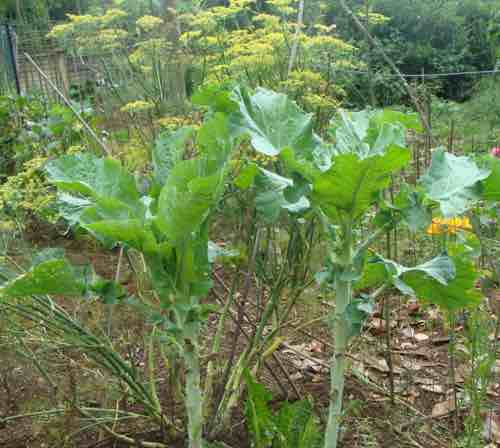
The flowering fennel in the background came from bulbs discarded by the grocer, and were planted in our green garden. It makes for a very interesting and different salad.
Just the introduction to lemongrass would have made the exercise worthwhile; it's a wonderful herb for our Thai curries.
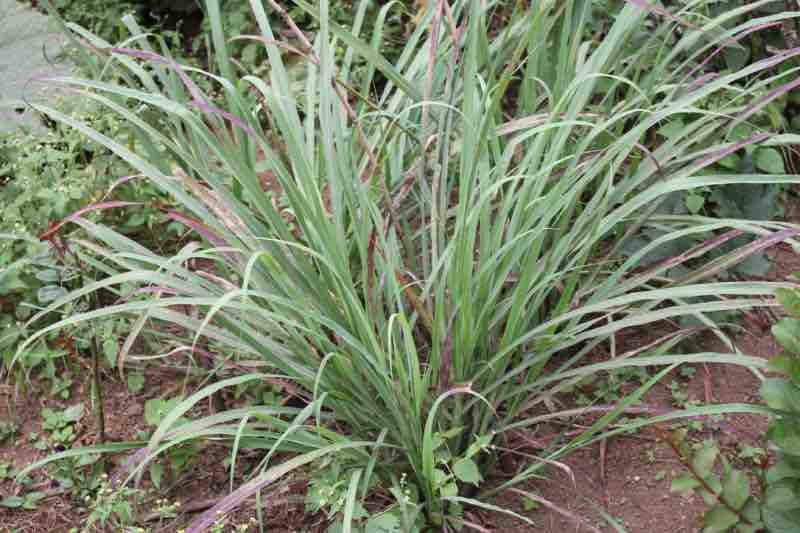
The material expressed on this page is gleaned from the nutritional and environmental literature; it is clearly referenced. A plain distinction is made between the author's opinion and that which is scientifically proven. When in doubt consult your health professional.
To suggest a correction or clarification, write to Dr Bernard Preston here. Contact.
Newsletter
Our newsletter is entitled "create a cyan zone" at your home, preserving both yourself and Mother Earth for future generations; and the family too, of course. We promise not to spam you with daily emails promoting various products. You may get an occasional nudge to buy one of my books.
Here are the back issues.
- Lifestyle and ideal body weight
- What are ultra-processed foods?
- Investing in long-term health
- Diseases from plastic exposure
- Intensive lifestyle management for obesity has limited value
- A world largely devoid of Parkinson's Disease
- The impact of friendly bacteria in the tum on the prevention of cancer
- There's a hole in the bucket
- Everyone is talking about weight loss drugs
- Pull the sweet tooth
- If you suffer from heartburn plant a susu
- Refined maize meal and stunting
- Should agriculture and industry get priority for water and electricity?
- Nature is calling
- Mill your own flour
- Bake your own sourdough bread
- Microplastics from our water
- Alternative types of water storage
- Wear your clothes out
- Comfort foods
- Create a bee-friendly environment
- Go to bed slightly hungry
- Keep bees
- Blue zone folk are religious
- Reduce plastic waste
- Family is important
- What can go in compost?
- Grow broad beans for longevity
- Harvest and store sunshine
- Blue zone exercise
- Harvest and store your rainwater
- Create a cyan zone at your home
When browsing use right click and "Open Link in New Tab" or you may get a bad gateway signal.
Did you find this page interesting? How about forwarding it to a friendly book or food junkie? Better still, a social media tick would help.
- Homepage
- Our green garden
- Confessions of a Waste Picker
Address:
56 Groenekloof Rd,
Hilton, KZN
South Africa
Website:
https://www.bernard-preston.com